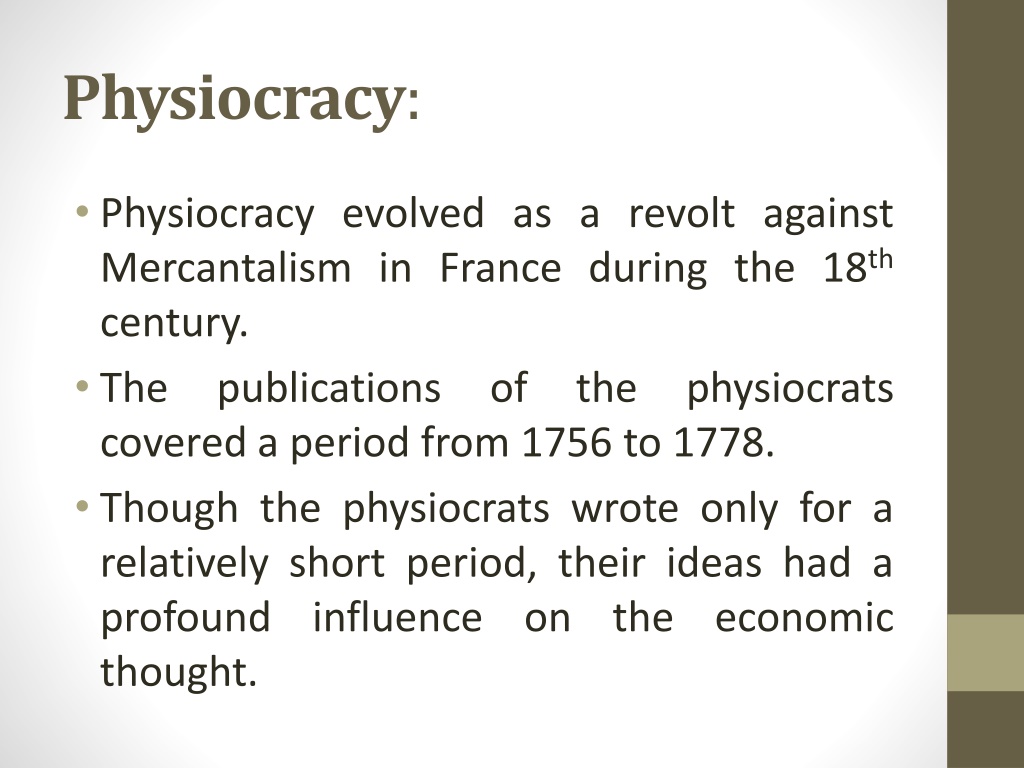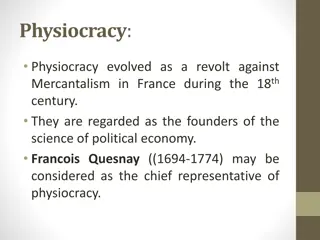The Rise of Physiocracy in 18th Century France
Physiocracy emerged in 18th century France as a response to the shortcomings of Mercantilism, focusing on agricultural prosperity and natural economic principles. Led by prominent thinkers like Francois Quesnay and Turgot, physiocrats challenged the prevailing economic system, influenced Adam Smith, and highlighted issues such as taxation injustice, government mismanagement, and exploitation by the elite classes.
Download Presentation

Please find below an Image/Link to download the presentation.
The content on the website is provided AS IS for your information and personal use only. It may not be sold, licensed, or shared on other websites without obtaining consent from the author.If you encounter any issues during the download, it is possible that the publisher has removed the file from their server.
You are allowed to download the files provided on this website for personal or commercial use, subject to the condition that they are used lawfully. All files are the property of their respective owners.
The content on the website is provided AS IS for your information and personal use only. It may not be sold, licensed, or shared on other websites without obtaining consent from the author.
E N D
Presentation Transcript
Physiocracy: Physiocracy evolved as a revolt against Mercantalism in France during the 18th century. The publications covered a period from 1756 to 1778. Though the physiocrats wrote only for a relatively short period, their ideas had a profound influence on the economic thought. of the physiocrats
Physiocrats are regarded as the founders of the science of political economy. Infact, Adam Smith was greatly influenced by the economic ideas of physiocrats. Francois Quesnay ((1694-1774) and Turgot (1727-1781) were the main proponents of physiocracy. The term physiocracy means Rule of Nature.
Factors that gave rise to Physiocracy: Firstly, physiocracy was essentially a revolt of the French against Mercantalism. Under Colbert, the Minister off France, mercantalism was carried to an extreme degree. This resulted in the neglect of agriculture and a lot of governmental regulations of industry. famous Finance
Secondly, the tax system of France at that time was corrupt, inefficient and unjust. The burden of taxation was heavy on the poor while the nobles and the clergy were exempted from direct taxation. The poor were affected by taxes such as the salt tax, the poll tax and by duties on goods passing from one province to another.
Thirdly, Government were in a bad shape. The unnecessary wars and the luxurious life at court made bankrupt. As a result, the government started borrowing loans conditions. the finances of the French the government under unfavourable
Fourthly, exploited by the nobles and other wealthy classes. The landowners took a large share of the agricultural produce. The government also imposed heavy taxes and restrictions commodities because policy of being in favour of manufactured goods. the French peasants were on agricultural mercantalist of
Fifthly, the economic performances and prospects of unfavourable compared Britain. Britain had already realized that it was a wrong policy to manufacture at the expense of agriculture. Agricultural revolution stared taking place in England with emphasis on large scale farming and scientific production. France appeared develop trade and techniques of
Lastly, there were other forces at work too. The political and moral philosophers of that time underlined the importance of the individual in their discussions. They emphasized that man must be the centre of philosophy and politics. And thus, the forces of liberty were at work.
THANK YOU



























